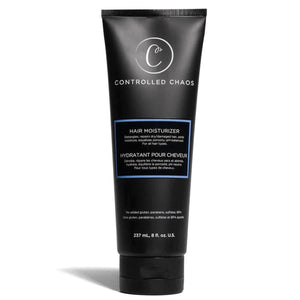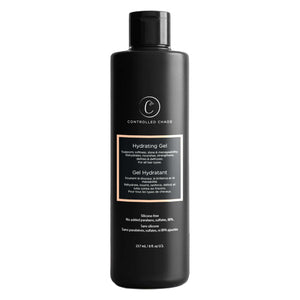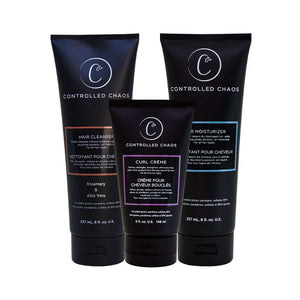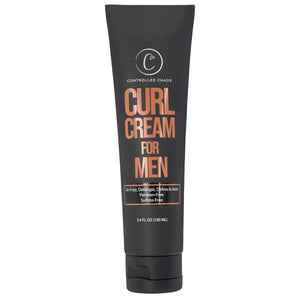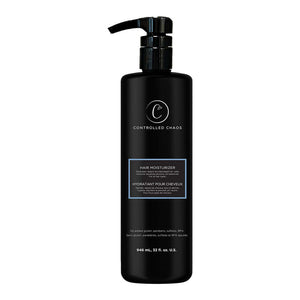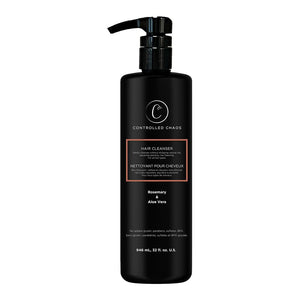

Finding the right balance when washing curly hair is crucial in maintaining health, hydration, and overall appearance. Curly hair tends to be drier than other hair types due to its natural structure, which makes it more prone to frizz and breakage.
Understanding how often should you wash curly hair is essential to prevent excessive dryness or oiliness while ensuring your curls remain clean, nourished, and well-hydrated. Adopting the appropriate washing frequency can preserve your hair's natural oils, enhance curl definition, and promote a healthier, more manageable mane.
This article will delve into how often you should wash your curly hair, providing valuable insights and guidelines to determine the optimal washing frequency for your unique hair type. We will explore the importance of maintaining a balance between cleanliness and moisture retention and discuss the factors that influence how often you should wash your curls.

Frequency Guidelines for Curly Hair
While the optimal washing frequency for curly hair varies from person to person, there are general guidelines to consider. For most individuals with curly hair, washing two to three times a week is a good starting point. This frequency allows for adequate cleansing and hydration without stripping the hair of natural oils. However, it's important to remember that everyone's hair is unique, so you may need to adjust the frequency based on your specific needs and preferences.
Finding the Right Balance: Determining the Optimal Washing Schedule
Signs Your Hair Needs Washing
Pay attention to the signs that indicate your curly hair needs washing. If your scalp feels excessively oily, itchy or has a buildup of product residue, it may be time for a wash. Similarly, if your curls appear limp, lifeless, or have lost their definition, it could be a sign that your hair needs cleansing to remove dirt and excess oils. Listen to your hair and scalp to determine when to wash and refresh your curls.
Signs You're Washing Your Hair Too Often
Washing curly hair too frequently can lead to dryness, frizz, and a lack of moisture. If your curls feel excessively dry, brittle, or straw-like, it may indicate that you're washing your hair too often. Additionally, if your scalp feels tight, itchy, or flaky after each wash, it could be a sign of overwashing. Adjusting your washing frequency can help restore the balance and prevent these issues.
Adjusting Washing Frequency for Personal Needs
Finding the optimal washing frequency for your curly hair often requires trial and error. Pay attention to how your hair and scalp respond to different washing frequencies and adjust accordingly. If your hair becomes too dry or frizzy with your washing schedule, consider extending the time between washes.
On the other hand, if your hair feels excessively oily or weighed down, you may need to wash it more frequently. Remember that your hair's needs can change with the seasons, lifestyle changes, or hormonal shifts, so be flexible and adaptable in your approach.
By considering the frequency guidelines, observing signs your hair gives you, and adjusting your washing schedule to meet your personal needs, you can find the right balance for washing your curly hair. Remember that it's a journey of discovering what works best for your unique hair type and maintaining a balance between cleanliness and hydration. With patience and attentiveness, you'll find the optimal washing schedule that keeps your curls healthy, vibrant, and beautifully nourished.
Understanding Curly Hair and Its Unique Needs
Characteristics of Curly Hair
Curly hair is characterized by its natural texture and shape, which sets it apart from straight or wavy hair. Due to its structure, it is typically more prone to dryness, frizz, and tangles. Curly hair has a unique pattern of twists, turns, and bends, which makes it harder for natural oils produced by the scalp to travel down the hair shaft. This reduces moisture distribution, making hydration a critical factor for maintaining healthy, well-defined curls.
Challenges of Washing Curly Hair
Washing curly hair presents specific challenges compared to other hair types. Traditional shampoos often contain harsh sulfates and detergents that strip away the natural oils from the hair, leaving it dry and vulnerable to breakage. Overwashing can further deplete the hair's moisture, causing it to become frizzy and lacking in shine. On the other hand, under washing can lead to product buildup and an unhealthy scalp environment. Striking the right balance is essential for preserving natural oils while maintaining a clean and fresh feel.
Impact of Washing Frequency on Curly Hair Health
The frequency at which you wash your curly hair plays a vital role in its overall health and appearance. While it depends on individual factors such as hair type, scalp condition, and lifestyle, washing curly hair too frequently can strip away the natural oils that provide the necessary moisture. This can result in dryness, frizz, and a loss of curl definition.
Conversely, infrequent washing can lead to product buildup, scalp issues, and a lack of cleanliness. Finding the right balance allows for adequate cleansing without compromising the hair's hydration levels.
By understanding the unique needs of curly hair and its challenges, you can make informed decisions regarding how frequently you wash your curls. Striving for a balance between cleanliness and moisture retention is critical to maintaining healthy, well-hydrated, and beautifully defined curly hair.
Factors to Consider When Determining Washing Frequency
Hair Type and Texture
The frequency you should wash your curly hair depends on your specific hair type and texture. Fine and thin curly hair tends to get weighed down more quickly by oils and products so it may benefit from more frequent washing. On the other hand, thick and coarse curly hair can handle longer intervals between washes. Understanding your hair's unique characteristics will help you determine the appropriate washing frequency that keeps your curls clean and well-hydrated without causing excessive dryness.
Scalp Condition
Consider the condition of your scalp when determining how often to wash your curly hair. If you have a naturally oily scalp, you may need to wash more frequently to remove excess oil and maintain a fresh feel. However, washing too often can exacerbate dryness and irritation if you have a dry or sensitive scalp. Pay attention to how your scalp feels and reacts after each wash to find the right balance for your needs.
Lifestyle and Daily Activities
Your lifestyle and daily activities can also influence how often you should wash your curly hair. More frequent washing may be necessary if you engage in activities that make your hair sweaty or expose it to environmental factors like pollution or excessive humidity. Similarly, if you use styling products regularly, you may need to wash more often to remove buildup. Adjust your washing frequency based on your individual lifestyle and the needs of your hair.
Environmental Factors
Environmental factors such as climate and pollution levels can impact the condition of your curly hair. In humid environments, moisture in the air can cause frizz and make your hair feel weighed down. In contrast, dry climates can contribute to increased dryness and moisture loss. Consider the environmental conditions you are exposed to and adjust your washing frequency accordingly to maintain a balance of cleanliness and hydration.
When determining how often to wash your curly hair, finding a routine that works for your hair type, scalp condition, lifestyle, and environment is crucial. Experiment with different washing frequencies, starting once or twice weekly as a general guideline, and observe how your hair responds. Remember to listen to your curls and adjust them to keep them healthy, hydrated, and looking their best.
The Science Behind Curly Hair Washing
Hair and Scalp's Natural Oils
Curly hair has a unique relationship with natural oils produced by the scalp. The twists and bends in curly hair make it challenging for these oils to travel down the hair shaft, resulting in drier strands than straight hair. These natural oils, also known as sebum, are crucial in moisturizing and protecting the hair. They act as a barrier, sealing in moisture and preventing excessive dryness. However, too much sebum can lead to a greasy scalp and product buildup, while too little can result in dry, brittle hair. Understanding the delicate balance of natural oils is key to maintaining healthy, hydrated curls.
Role of Shampoos and Cleansers
Shampoos and cleansers are vital in washing curly hair by removing dirt, sweat, excess oils, and product buildup. However, not all shampoos are created equal. Traditional shampoos often contain harsh sulfates and detergents that can strip away the natural oils from curly hair, leaving it dry and prone to frizz. Sulfates can disrupt the hair cuticle, making it more difficult for moisture to penetrate the hair shaft. That's why using a sulfate-free, moisturizing shampoo designed for curly hair is crucial. These formulas cleanse the hair gently while preserving its natural oils and moisture balance.
Impact of Water Temperature and Pressure
The temperature and pressure of the water used during hair washing can also impact the health and hydration of curly hair. Hot water can strip away natural oils and cause dryness, while cold water may not effectively cleanse the hair and scalp.
The optimal water temperature for washing curly hair is lukewarm, as it helps open the hair cuticle for thorough cleansing without excessively drying out the hair. Additionally, water pressure should be gentle to avoid disrupting the hair's natural structure and causing tangles or breakage. It's essential to strike a balance that effectively cleanses the hair and scalp while minimizing moisture loss.
Personalizing Your Curly Hair Washing Routine
Creating a Customized Hair Care Plan
Creating a personalized hair care plan is essential for optimizing your curly hair-washing routine. Consider your hair type, texture, scalp condition, and lifestyle. Consult with hair care professionals specializing in curly hair to gain valuable insights and guidance. Assess your hair's unique needs and develop a routine that addresses those needs. This may involve experimenting with different products, techniques, and washing frequencies to find the best for you.
Listening to Your Hair's Needs
Your hair communicates its needs if you pay attention. Notice how your curls respond to different products, washing techniques, and environmental factors. If your curls lack definition, feel dry, or are prone to frizz, it may be a sign that adjustments are needed in your washing routine. Additionally, be mindful of how your scalp feels. Itching, flakiness, or excessive oiliness can indicate that your routine needs fine-tuning. By listening to your hair's needs, you can make informed decisions and tailor your washing routine for optimal results.
Maintaining a Consistent Routine for Optimal Results
Consistency is vital in caring for curly hair. Once you have established a washing routine that works well for your hair, maintain it consistently. Texture allows your hair to adapt and thrive as it adapts to a regular cleansing, moisturizing, and styling schedule. Remember that it may take time for your hair to adjust to a new routine, so be patient and give it a chance to respond positively. A consistent pattern can improve your curly hair's health, hydration, and appearance.
Conclusion
In conclusion, washing curly hair requires a thoughtful and personalized approach to ensure optimal health, hydration, and definition of your curls. Understanding the unique needs of curly hair, such as its natural oils, the role of shampoos and cleansers, and the impact of water temperature and pressure, is crucial for developing an effective washing routine.
Emphasizing the Importance of Regular Care for Healthy, Beautiful Curls
Regular care is crucial for maintaining the health and beauty of your curly hair. Establishing a consistent washing routine customized to your hair's needs ensures that your curls receive the necessary cleansing, hydration, and protection. Commitment to regular care helps prevent dryness, frizz, and breakage, promoting your curls' long-term health and vitality.
Frequently asked questions
Is it OK to wash curly hair every day?
Washing curly hair daily can strip away natural oils, leading to dryness and frizz. It's generally recommended to wash curly hair 2-3 times a week to maintain moisture and curl definition.
Is washing curly hair 3 times a week too much?
Washing curly hair 3 times a week is generally considered an appropriate frequency. However, it may vary depending on individual hair types and needs. Pay attention to your hair's response and adjust accordingly.
Does curly hair need to be washed less often?
Curly hair tends to be drier and benefits from retaining its natural oils. Washing curly hair less often, around 2-3 times a week, helps maintain hydration and prevent dryness and frizz.
Is it okay to wash curly hair every 4 days?
Washing curly hair every 4 days can suit some individuals, depending on hair type and personal preference. It allows the hair to retain more natural oils, providing moisture to the curls.
How to wash wavy hair?
To wash wavy hair, start by wetting the hair with lukewarm water. Apply a gentle, sulfate-free shampoo, massaging it into the scalp and running it through the lengths. Rinse thoroughly and follow with a moisturizing conditioner, focusing on the mid-lengths and ends. Gently detangle with a wide-toothed comb or fingers, then rinse again.
How often should you wash wavy hair?
The optimal washing frequency for wavy hair can vary, but typically 2-3 times a week is recommended. Adjust the frequency based on your hair's needs, scalp condition, and preferences.
How often should you condition curly hair?
Conditioning curly hair is crucial for hydration and manageability. It's generally recommended to condition curly hair every time you wash it, focusing on the mid-lengths and ends. Adjust the amount of conditioner based on your hair's needs.
How often should I wash my curly hair if I work out?
If you work out and sweat heavily, you may need to wash your curly hair more frequently every 2-3 days. Consider using a co-wash or a gentle cleansing conditioner between full washes to refresh and maintain moisture in your curls.


